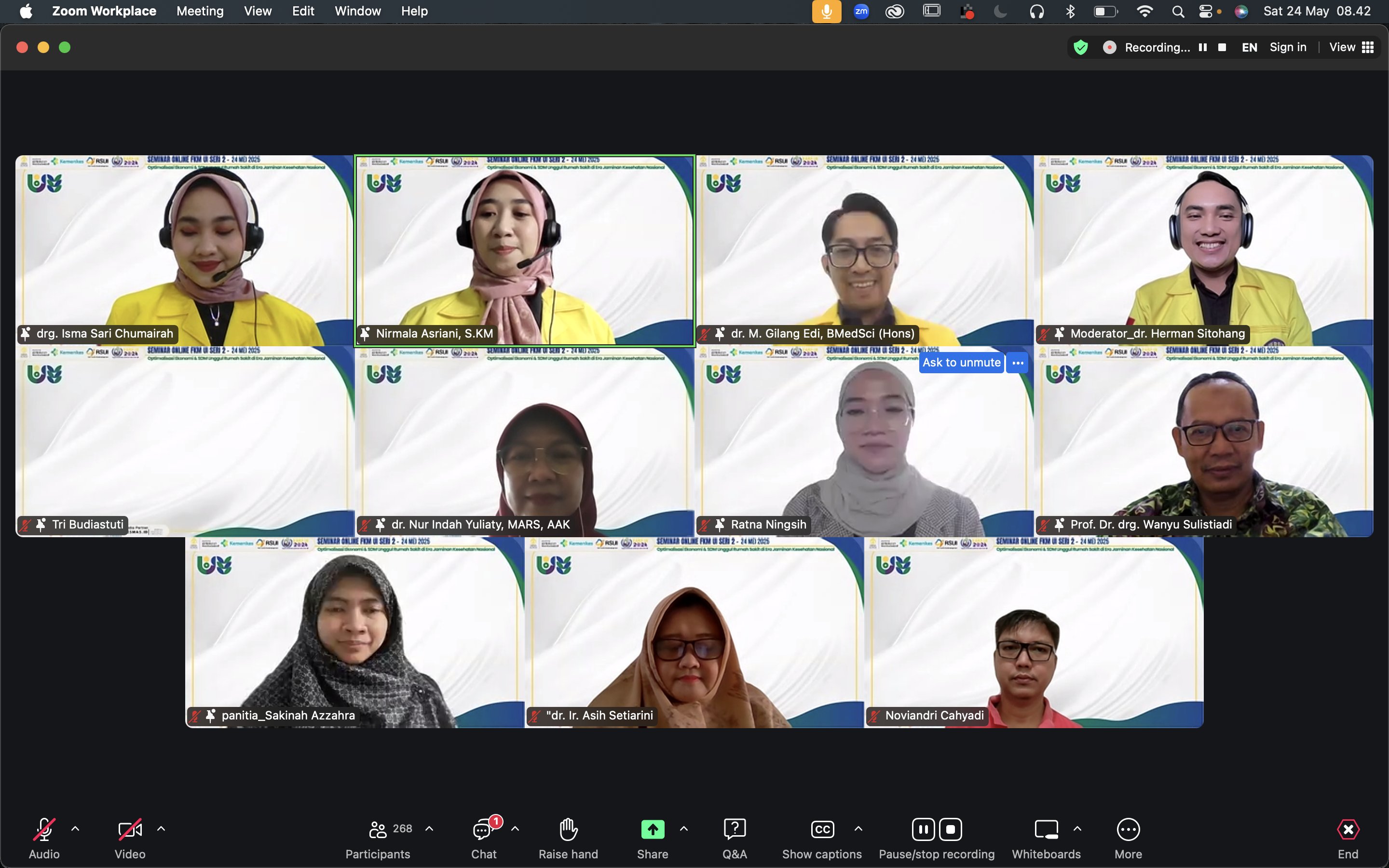The Hospital Administration Studies (KARS) Program at the Faculty of Public Health, Universitas Indonesia (FPH UI), in collaboration with the Universitas Indonesia Hospital (RSUI), held the 2025 FPH UI Seminar Online (Semol) Series 2 themed “Optimizing Hospital Economics and Human Resource Excellence in the BPJS Era.” The seminar aimed to address the challenges faced by hospital management under the National Health Insurance (JKN) system, especially in managing economic resources and strengthening human capital amidst regulatory limitations and changing dynamics. Featuring leading experts and national policymakers, the Zoom-based event served as a constructive and insightful discussion forum for over 450 participants, including students, academics, and healthcare practitioners from various institutions.
Dr. M. Gilang Edi, B.Med.Sci (Hons), the event’s committee chair, stated that the seminar reflects the real contribution of FPH UI and RSUI in improving hospital management quality in Indonesia. The session was moderated by Dr. Herman Tuah Sitohang, who facilitated the dynamic exchange. The seminar also received support from partners and sponsors, including Wund+, Profitindo, PT Pharos, Prima Ku, and the public health platform Kesmas ID.
In her opening remarks, the Vice Dean for Education, Research, and Student Affairs of FPH UI, Dr. Ir. Asih Setiarini, M.Sc., emphasized the relevance of the seminar’s theme in today’s hospital landscape in Indonesia. She noted that BPJS Kesehatan plays a vital role in sustaining hospital operations. “Hospitals in the BPJS era must manage finances meticulously—not only to be efficient but also to add value for institutions and the broader community,” said Dr. Asih. She also highlighted the importance of high-quality, professional, and adaptive human resources in enhancing hospital competitiveness amid public service challenges. Thus, proper economic and HR management and system optimization are now more urgent than ever.
Professor Dr. Adang Bachtiar, M.P.H., D.Sc., a professor in the Department of Health Administration and Policy at FPH UI, also expressed his appreciation for the seminar initiated by KARS master’s students. “Hospitals are a constantly growing industry, which is why sound economic calculation is fundamental to sustainability,” said Prof. Adang. “Moreover, in the face of challenges in the healthcare service industry, human capital remains the most critical asset to develop continuously.”
Aligning with the seminar’s theme, two keynote speakers presented their insights:
-
Dr. Nur Indah Yuliaty, M.A.R.S., A.A.K., representing the President Director of BPJS Kesehatan, discussed the impact of the JKN program on hospitals’ economic sustainability.
-
Prof. Dr. Drg. Wahyu Sulistiadi, M.A.R.S., a professor in the Department of Health Administration and Policy at FPH UI, focused on the importance of developing superior human resources to improve hospital performance and competitiveness.
In her presentation, Dr. Nur Indah emphasized that the JKN program is not merely a technical policy but a constitutional mandate. “Falling ill is not just a medical issue—it affects the economy and society. Health insurance is a right for every citizen,” she said, quoting Articles 28H and 34 of the 1945 Constitution. With rising service costs, an increasing burden of chronic-degenerative diseases, and limited healthcare access, JKN has become a real solution to healthcare service disparities. As of December 31, 2024, JKN had covered 98.45% of Indonesia’s population.
The BPJS Kesehatan system not only funds individual healthcare services but also influences public health behaviors. “JKN changed how people view health—from a costly commodity to a constitutional right,” Dr. Indah stated. Nonetheless, challenges remain, such as increased healthcare provider workload, service disparities across regions, and limited public understanding of JKN procedures. Still, she expressed optimism that strengthened partnerships, regular evaluations, and improved coordination will enhance service equity and quality.
Complementing the presentation, Prof. Wahyu Sulistiadi highlighted the importance of responsiveness, empathy, effective communication, and quality assurance as pillars of excellent service. He proposed strategies such as patient-centered care-based SOPs, cross-functional training, and the use of feedback systems and service quality dashboards. “When patients feel respected and understood, satisfaction rises, and litigation risks can be reduced,” said Prof. Wahyu.
In terms of career development, Prof. Wahyu stressed that modern hospitals can no longer rely solely on formal training. Mentorship, job rotation, and talent mapping are essential. Career progression, he said, should be based not just on tenure, but on competence and achievements. He also encouraged hospitals to adopt flexible, results-based working systems that meet the expectations of the increasingly dominant Gen Y and Z healthcare workforce.
Both speakers agreed that the sustainability of future hospitals depends heavily on a strong health insurance system and high-performing, adaptable human resources. By spotlighting hospital economic sustainability and HR development in the JKN era, FPH UI once again affirms its role as a leading institution bridging science, policy, and practice. (DFD)

